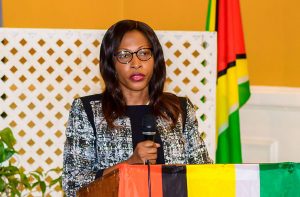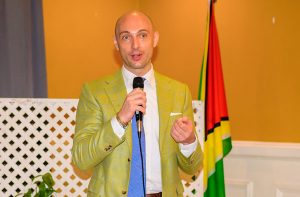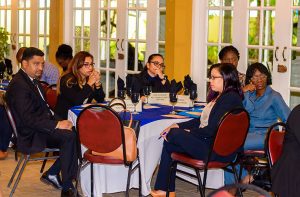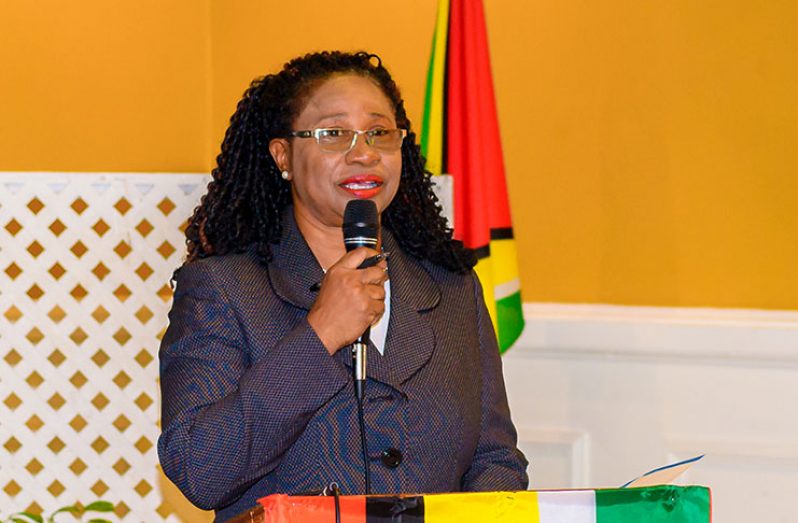–after just five months in operation
SOME five months after the Sexual Offences Court was opened here, a total of 14 cases have been heard by the court, with some nine persons being found guilty.
This was revealed on Friday by Justice Simone Morris-Ramlall during the opening of a two-day training course for members of the judiciary and magistracy, legal fraternity, non-governmental organisations and other stakeholders on the work of the Sexual Offences Court and the Sexual Offences Act at the Georgetown Club, Camp Street.
Justice Morris-Ramlall said the court has been meeting expectations, while allowing victims the opportunity to testify in a comfortable environment. She said efforts will be continued to implement the sexual offences guidelines.

Of the 14 matters that have been completed, seven dealt with sexual activity with a child or family member, and four with the rape of a child under the age of 16.
All but one of the virtual complainants, she said, were female, and aged between three and 28 at the time of commission of the offence.
Ten of the victims, she said, were 10 years old or younger at the time of the commission of the offence, while the ‘perps’ were over 30. Few were older than 40, Justice Ramlall said.
“All of the VCs utilised the audio-visual link, except for two, and those two were adults,” she explained. “One of the complainants testified via Skype from Barbados; 12 of the 14 virtual complainants had their support persons present and these were persons from Blossom Inc, the Child Care and Protection Agency and relatives.”
The matters, she said, originated from Ituni, North West District, Linden and Mahaica, with trials ranging from two to eight days. In terms of verdicts, she said nine came in guilty, and four not guilty. One had a hung jury.
“The sentences imposed ranged from nine years to life imprisonment. The nine-year imprisonment was for sexual activity with a child and that child was not a family member and there was no penetration involved,” the judge reported during her statistical overview of the operation of the Sexual Offences Court.
ENHANCE EFFICIENCY
Chancellor of the Judiciary (ag), Justice Yonette Cummings-Edwards, told course participants that the aim of the Sexual Offences Court is to enhance the efficiency in prosecution and adjudication of cases of sexual offences, and more importantly to respond to the needs of victims.

As such, the hosting of this first training programme on the court and the legislation are of significant importance in the judiciary’s history.
“It is no secret that testifying in court would be a traumatic experience, and moreso in matters relating to sexual offences,” the chancellor said, while noting that support services are being provided witnesses to help reduce the secondary victimisation and trauma associated with the exercise.
Such assistance, she said, is being provided by the Ministry of Social Protection as well as non-governmental organisations, but was quick to note “even the trainer needs some sort of assistance, help or guidance in that regard.”
There’s also a dire need, the chancellor said, for the employment of psychological skills for the improvement of the services provided by the court, as well as the improvement of the skills of court personnel.
“Our Sexual Offences Act, which was passed in 2010, itself provides for training in this regard. It is a comprehensive, forward thinking, integrated piece of legislation passed by our parliament,” Justice Cummings-Edwards said, while acknowledging the United Nations Children’s Fund’s (UNICEF) partnership with the judiciary not only for the two-day training programme, but also for the establishment of the court, which happens to be the first in the Region.
PSYCHOLOGICAL SKILLS
Like Justice Cummings-Edwards, Chief Justice (ag) Roxane George-Wiltshire said the programme will see discussions on the psychological skills needed to deal with sexual offence cases.

She said, too, that the training programme, as spearheaded by the chancellor, “seeks to enhance our capabilities, and to be more responsive to the issues that are very relevant in our communication and interaction with vulnerable persons, more specifically with sexual offences cases.”
Paolo Marchi, Deputy Representative UNICEF Guyana and Suriname, lauded the judiciary for taking steps in educating its members about the legislation and the operation of the court.
“The frequency and dreadful levels of violence demand action by all, and this court is one of the concrete, tangible steps the country is taking to address it,” he said. He noted that over the past three years, the number of cases of violence and abuse has been alarming, and to the point where it is worrisome for a country with a small population like Guyana.
“Undoubtedly, the court, through specialised services, will contribute to the elimination of violence against women, children’s voice and girls,” he said, adding that efforts such as the establishment of the Sexual Offences Court and the training of members of the judiciary and magistracy, represent concrete steps that “Guyana means business.”
Marchi said UNICEF will continue to partner with stakeholders, with the ultimate objective of reducing and preventing sexual violence here. Additionally, he said, his organisation is also partnering with the University of Guyana in delivering for the first time a full curriculum in psychology.




.png)









